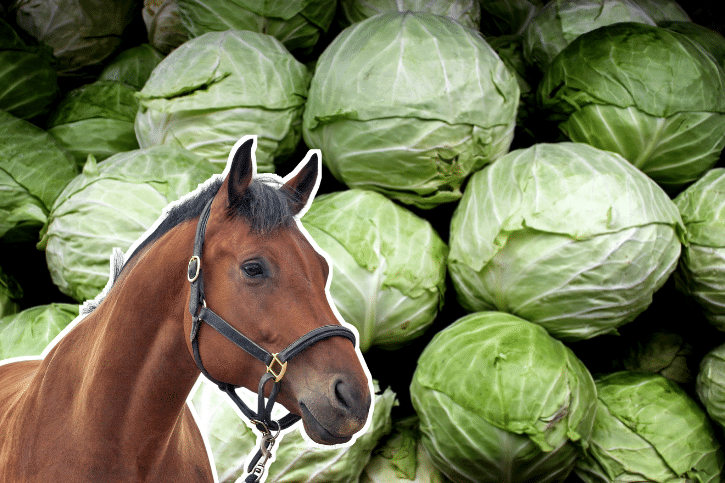Can Horses Eat Cabbage?
While eating out with a friend the other day he ordered a cabbage soup to start, and very often the number one conversation on our lips is horses.
We always like to find new treats and ways to spice up our horses’ diets, so naturally, we wondered whether horses could eat cabbage.
Neither of us had tried it before, so I decided to look into the question.
So, can horses eat cabbage?
The unfortunate answer is no, cabbage is not really safe for horses. Cabbage contains very high concentrations of sugar called raffinose, which can cause major gastrointestinal problems for your horse even in small quantities. A bit of gas might not be so bad for us but can cause serious abdominal pain for a horse.
Cabbage might be great for us, then, but it’s not a great choice for horses.
We will get into the details of why, but there are plenty of better alternatives to feeding your horse on cabbage in general.
There may be a lot of healthy nutrients in cabbage, but they could get all the same without the raffinose from elsewhere.
So, why exactly is cabbage such a no-go area for horses?
Let’s consider it.
Why is cabbage bad for horses?
Cabbage is part of a large family of vegetables called Brassica that includes other popular household vegetables like cauliflower, collard greens and brussels sprouts.
Most of these vegetables contain a large amount of a compound called raffinose.
Raffinose is a type of sugar composed of three other sugars, making it chemically complex.
Raffinose is also present in beans.
The reason raffinose can be so problematic for horses is that it is very difficult for them to break down, and the result of it struggling hard to break down in the gut is gas.
Gas is the waste product of the attempt to digest sugar.
A similar thing happens in humans who are lactose intolerant; we lack the ability to break down lactose, and it creates gas in our gut.
Not to downplay the problems associated with gas in humans, but gas in horses can be seriously problematic.
It causes major abdominal pain because of the way they stand.
It can weigh their whole abdomen down.
In small enough quantities, the raffinose present in cabbage probably wouldn’t be a problem for your horse, and it would even enjoy the treat. According to some horse owners, 2-3 ounces a day will not cause problems.
When fed in dry form, cabbage can be less problematic as it can prevent stomach ulcers.
Around 90% of horses struggle with stomach ulcers at some point in their life, but dry cabbage can help reduce the risk of this.
So, cabbage is not without its redeeming qualities.
You should always carefully observe your horse’s reaction to a new food.
If it causes a lot of gas, your horse is at best in discomfort and at worst in pain.
Just be careful how much they eat.
Can horses eat green cabbage?
Green cabbage is the most common variety found and cooked with.
It has a large round head densely packed with leaves.
Green cabbage is no good for horses.
Being the most common variety, it contains high concentrations of raffinose and is not good for horses.
Can horses eat white cabbage?
White cabbage, though a delicious cooking ingredient, is not good for horses.
Indeed, this is part of the reason it causes so many problems for horses.
Cabbage isn’t something we typically eat raw, but raw veg is the only way to safely give horses veg.
Raw cabbage would be problematic for many humans as well.
White cabbage is just the same, containing unsafe quantities of raffinose for your horse.
Can horses eat pointed cabbage?
This might be a variety you’re less familiar with, but it is equally problematic as any other type of cabbage.
It may have more delicate leaves and be less durable than other types of cabbage, but it’s still just as harmful for your horse.
Can horses eat red cabbage?
Red cabbage, unfortunately, poses the same problems.
It contains just the same quantities of raffinose as green cabbage, so you shouldn’t feed this to your horse.
Can horses eat raw cabbage?
Raw cabbage is likely to be the worst for your horse, as some of the raffinose can break down in the cooking process.
Raw cabbage is how your horse would prefer it, were they able to eat it.
But raw cabbage will cause gas and discomfort for your horse, and shouldn’t eat it.
Can horses eat cooked cabbage?
Honestly, horses probably shouldn’t eat cooked anything.
They are grazers, so their diet should really be hay and raw fruit and vegetables.
Cabbage is certainly no different, and it isn’t made any safer by being cooked.
Cabbage is probably just not worth it.
There are plenty of other options available which provide the same benefits and nutrients as cabbage without the excess raffinose.
So, cabbage may seem like a healthy option for a big herbivore like a horse.
But horses are actually a lot more sensitive than we might imagine, and we should be carefully considerate of that when we try to put together a healthy diet for them.
Their diets in the wild are fairly simply, since they’re primarily grazers who eat grass and plants.
On your farm or homestead, they probably mostly eat hay, and even a slightly more nutritionally complex vegetable like cabbage can be highly problematic.
Stay away from cabbage in your horse’s diet.
